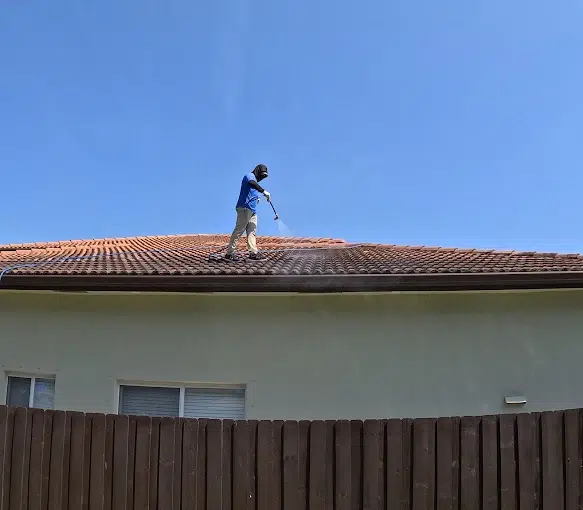Quick Summary:
Before we dive in, here’s a quick look at how these two cleaning methods compare, so you can instantly see which one might suit your property best.
| Feature | Pressure Washing | Soft Washing |
| Water Pressure | Uses high-pressure water to blast away dirt and grime. | Uses low-pressure water combined with cleaning solutions. |
| Cleaning Method | Relies on force to remove buildup from hard surfaces. | Uses detergents to gently break down mold, mildew, and bacteria. |
| Best For | Driveways, sidewalks, patios, pool decks, and concrete surfaces. | Roofs, siding, stucco, awnings, and solar panels. |
| Results | Immediate and visibly cleaner surfaces. | Longer-lasting cleanliness that prevents regrowth. |
| Risk Level | Can damage delicate surfaces if not done correctly. | Safe for all materials and finishes. |
| Environmental Impact | Uses mostly water under pressure. | Uses eco-friendly solutions safe for landscaping. |
| Ideal Use in Miami | Great for removing grime caused by traffic and weather exposure. | Perfect for tackling algae and mold from humidity and salt air. |
You’ve probably seen those dark streaks on your roof or the dull look of your driveway after months of Miami weather. The humidity, rain, and salt air can do a number on your home’s exterior.
That’s when cleaning becomes more than just a chore, it’s a must. But when it comes to exterior cleaning, people often wonder about one key question: Pressure Washing vs. Soft Washing, which is better?
If you’ve searched for pressure cleaning Miami, you’ve likely seen both terms pop up everywhere. Let’s make it simple. Both methods are effective, but they serve different purposes. Here’s how to know which one’s right for your home or business.
Understanding Pressure Washing
Pressure washing uses high-powered water spray to remove dirt, mold, algae, oil, and grime from tough surfaces. Imagine your driveway or sidewalk covered in years of dirt buildup, pressure washing blasts that away in minutes.
It’s especially great for:
- Concrete driveways and walkways
- Stone patios
- Pool decks
- Parking lots or commercial areas
This method relies on force. The high pressure cuts through layers of stubborn dirt and stains that regular cleaning can’t handle. It’s fast, powerful, and gives instant visible results.
But here’s the catch: not every surface can handle that kind of power. Too much pressure can damage soft materials like painted walls, roof shingles, or wood panels. That’s why it’s important to know when to use it, and when to switch to something gentler.
Understanding Soft Washing
Soft washing is the gentler cousin of pressure washing. Instead of high pressure, it uses a low-pressure stream combined with eco-friendly cleaning solutions. These cleaning agents break down dirt, mold, and algae at the root.
Think of soft washing as a deep cleanse rather than a hard scrub. It’s perfect for delicate surfaces like:
- Roof tiles
- Stucco walls
- Vinyl siding
- Painted exteriors
- Solar panels and awnings
In humid areas like Miami, soft washing is a game-changer. The moisture and heat create the perfect environment for mold and mildew to thrive. Soft washing not only cleans the surface but also helps prevent regrowth.
It’s safe, gentle, and eco-conscious, ideal for preserving the integrity of your home while keeping it spotless.
Pressure Washing vs. Soft Washing: The Main Differences
Let’s break it down clearly so you can decide what fits your needs. When it comes to Pressure Washing vs. Soft Washing, both methods clean effectively, but they work in very different ways and are suited for different types of surfaces around your property.
- Pressure Washing uses high-pressure water to blast away years of dirt, grime, and stains from strong surfaces like concrete, brick, driveways, and sidewalks.
- It’s the perfect method when you want a deep, instant clean that restores your surfaces to their original brightness.
- This method is especially effective for areas that get a lot of foot traffic or exposure to the elements, such as pool decks and patios.
- However, because it relies on force, it’s important to use the right pressure setting to avoid damaging delicate materials. That’s why professional pressure cleaning Miami services are so valuable, experts know exactly how much power to use on each surface for the best results.
- Soft Washing takes a gentler approach, using low-pressure water combined with eco-friendly cleaning detergents that dissolve mold, algae, and dirt at their source.
- This method is ideal for delicate surfaces like roofs, vinyl siding, painted walls, and solar panels that could easily be damaged by high pressure.
- Unlike traditional Pressure Washing, which removes surface dirt, soft washing actually targets the root cause of discoloration, leaving your property cleaner for a longer time.
- It’s also safer for your landscaping and better for the environment, making it a great option for homeowners in Miami’s humid, salt-heavy climate.
In Simple Terms
- Pressure Washing uses strength and speed to clean tough, durable surfaces.
- Soft Washing uses precision and smart cleaning agents to protect and restore delicate areas.
- Both work beautifully, the key is knowing which one to use where. For example, if your concrete driveway looks grimy or your patio has slippery algae spots, go for Pressure Washing. But if your roof has dark streaks or your siding looks dull and weathered, Soft Washing will gently bring it back to life without causing any damage.
When to Choose Pressure Washing
Pressure washing is your go-to for surfaces that can handle a little power. If you’ve got oil stains on your driveway or a layer of grime on your concrete, this method cuts through it with ease.
It’s especially useful for:
- Driveways with tire marks
- Sidewalks and entryways
- Pool decks with slippery algae
- Commercial buildings exposed to heavy traffic
High pressure restores surfaces quickly, leaving them fresh and bright. The key is using the right pressure level and equipment, that’s where professionals come in. We adjust everything to match your surface, preventing damage while ensuring a spotless finish.
When to Choose Soft Washing
Soft washing is best when you need to clean without the risk of stripping paint or breaking materials. Roofs, stucco, and siding are all better off with this approach.
Our soft washing process uses special cleaning solutions that lift dirt and kill mold spores. The result? Surfaces stay clean longer.
For Miami homeowners, this is especially important. The humidity and salt air can make algae return quickly. A good soft wash helps prevent that, keeping your home’s exterior looking new for months.
It’s also safe for your landscaping, no harsh chemicals or overspray damage. Just a clean, healthy-looking property.
Why You Should Always Hire Professionals
You might think pressure cleaning looks easy, just point and spray, right? Not quite. Using the wrong pressure setting or cleaning agent can cause serious damage. We’ve seen chipped paint, cracked roof tiles, and even broken windows from DIY attempts.
When you hire professionals like us, you get trained technicians who know how to evaluate each surface. We decide whether it needs pressure washing or soft washing based on material, location, and dirt type.
We’ve been doing this for decades in Miami’s unique climate. We understand how salt air, humidity, and heat affect different materials. Our team uses modern equipment, safe cleaning products, and techniques that protect your property while restoring its beauty.
You’ll not only see the difference but also feel confident that your home is in good hands.
Eco-Friendly and Safe Cleaning You Can Trust
Another reason to choose a professional cleaning service is our commitment to safety and sustainability. We use biodegradable cleaning agents that are tough on dirt but gentle on the environment.
This means no harmful runoff that can damage your plants or pollute the local ecosystem. Our goal is to make your home sparkle, without harming what surrounds it.
Conclusion
Both Pressure Washing and Soft Washing have their place. The right choice depends on your property’s surfaces and cleaning needs. In the humid climate of Miami, using the right method makes all the difference, not only in how your home looks but also in how well it’s protected.
At Kleanway, we take pride in offering both methods with precision, care, and experience. Whether your roof needs a gentle touch or your driveway needs a deep clean, we’ve got you covered.
So, if you’ve been wondering about Pressure Washing vs. Soft Washing, let us help you find the best fit for your home.
Ready to give your property the care it deserves?
Contact Kleanway Pressure Cleaning today for a free quote and experience the difference our professional pressure cleaning in Miami can make. We’ll help your home or business shine, safely, effectively, and with results that last.
Frequently Asked Questions
- What’s the main difference between pressure washing and soft washing?
Pressure washing uses high-pressure water to clean hard surfaces like concrete or stone. Soft washing uses low pressure and cleaning solutions to safely clean delicate areas like roofs, siding, and painted walls. - Is soft washing better than pressure washing?
Not necessarily, both methods are effective. The right choice depends on the surface you’re cleaning. Hard surfaces need pressure, while softer or painted areas do better with gentle washing. - Can I pressure wash my roof?
It’s not recommended. Roofs can easily be damaged by high pressure. Soft washing is the safer and smarter choice for removing algae, mold, and dirt from roof tiles. - How often should I get my home pressure cleaned?
In Miami’s humid climate, once or twice a year is ideal. Regular cleaning prevents mold, mildew, and grime from building up, keeping your home’s exterior fresh and safe. - Is soft washing safe for plants and pets?
Yes. Professional cleaners like us use eco-friendly, biodegradable solutions that are safe for your landscaping and pets. We always take precautions to protect your surroundings. - Can I do pressure cleaning myself?
It might seem easy, but DIY pressure washing can cause damage if done incorrectly. Professionals use the right equipment, nozzles, and cleaning solutions for each surface, ensuring safety and long-lasting results. - What types of surfaces are best for pressure washing?
Driveways, sidewalks, patios, parking lots, and pool decks are perfect for pressure washing. These surfaces are strong enough to handle higher water pressure. - What types of surfaces should only be soft washed?
Roofs, vinyl siding, stucco, painted walls, awnings, and solar panels should only be soft washed to avoid cracks, peeling paint, or surface damage. - How long do the results of pressure or soft washing last?
With the right technique and cleaning solutions, your surfaces can stay clean for six months to a year. Regular maintenance helps extend the life of your property’s exterior. - Why should I choose professionals for pressure or soft washing?
Professionals know which method to use, how to adjust pressure safely, and what cleaning products work best. Plus, hiring experts saves you time, prevents damage, and ensures your property always looks its best.






